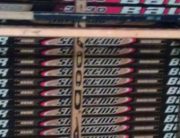Job Description
For many of us, refrigerators, or more specifically, refrigerator doors, serve as a convenient place for notes, photos, messages and To-Do Lists. Unfortunately, this often results in a little too much clutter, as well as an assortment of magnets and scotch tape markings. For a smarter way to display and organize stuff, try these easy steps in creating your own magnetic message board.
Lumber Required:
- 3/4” Pine (4 pieces total, 2 short and 2 long – 2 1/4” x 40 1/2” and 2 1/4” x 16”)
Materials List:
- Backboard: 3/16” x 12 1/4” x 36 3/4”
- Magnetic surface: 12 1/4” x 36 3/4”
- Tools Needed:
- Table or handsaw
- C-clamps
- Web clamp
- Wood glue
Construction Steps:
Step 1: Size everything up
The first step involves sizing up and cutting your frame. Using a table or handsaw, simply measure and cut to your specific length and width. Then, on both ends of all four frames, prepare 3/8″ x 2 1/4″ x 2 1/4″ lap joints.
Step 2: Jazz up the joints
A small but important detail is how to decorate or highlight the joints. Consider a routed V-groove rather than trying to hide them. One option is running a 45° chamfer (beveled edge) around the perimeter of all the forward-facing edges, which creates an attractive look with matching grooves.
Step 3: Seal the deal
Assemble your frame by applying glue to all joint surfaces. C-clamp each corner and tighten a web clamp around the entire frame. After measuring to ensure that the frame is square – by comparing two diagonal measurements from corner to corner – tighten the C-clamps and wipe off any excess glue.
Step 4: Go around back
When your glue has dried, loosen and remove the clamps. Then rout a 3/8″-wide rabbet (recess) around the back inside edge (to hold your sheet metal and backer board). Square off the rabbet’s corners with a chisel and adjust the depth to match the combined thickness of the backboard and sheet metal. Be sure to add an extra 3/16″ to 1/4″ for a bead of caulking, which will secure the sheet metal to the frame.
Step 5: Top it off
Apply your finish. A good option for a base is pigment-free natural stain to bring out the grain of your wood. Follow this with a few coats of polyurethane as a protective top layer.
Step 6:
Cut your sheet metal and backer board to size, then put the two pieces into the frame. Follow this by running a bead of silicone caulking around the perimeter (which will hold the sheet metal and backer board in place). Finally, install hooks and wire to hang the frame—either vertically or horizontally.
Check your provincial and municipal codes before starting any project. Follow all safety precautions. Information in this document has been furnished by the North American Retail Hardware Association (NRHA) and associated contributors. Every effort has been made to ensure accuracy and safety. Neither NRHA, any contributor nor the retailer can be held responsible for damages or injuries resulting from the use of the information in this document.




